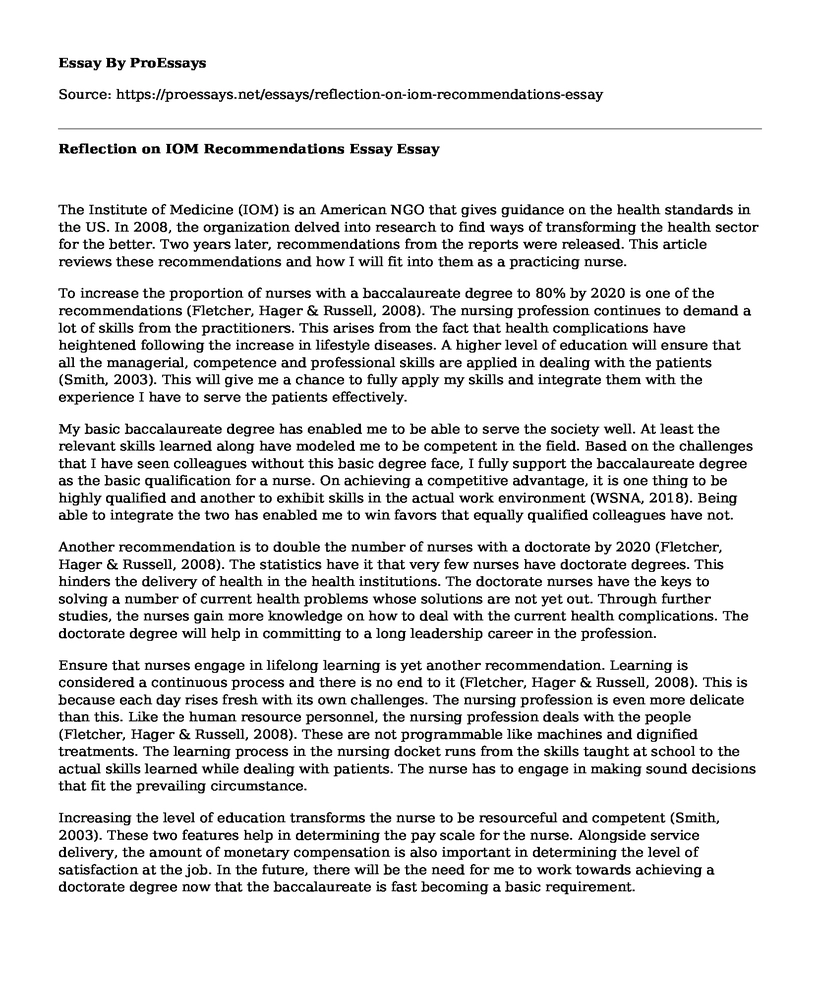The Institute of Medicine (IOM) is an American NGO that gives guidance on the health standards in the US. In 2008, the organization delved into research to find ways of transforming the health sector for the better. Two years later, recommendations from the reports were released. This article reviews these recommendations and how I will fit into them as a practicing nurse.
To increase the proportion of nurses with a baccalaureate degree to 80% by 2020 is one of the recommendations (Fletcher, Hager & Russell, 2008). The nursing profession continues to demand a lot of skills from the practitioners. This arises from the fact that health complications have heightened following the increase in lifestyle diseases. A higher level of education will ensure that all the managerial, competence and professional skills are applied in dealing with the patients (Smith, 2003). This will give me a chance to fully apply my skills and integrate them with the experience I have to serve the patients effectively.
My basic baccalaureate degree has enabled me to be able to serve the society well. At least the relevant skills learned along have modeled me to be competent in the field. Based on the challenges that I have seen colleagues without this basic degree face, I fully support the baccalaureate degree as the basic qualification for a nurse. On achieving a competitive advantage, it is one thing to be highly qualified and another to exhibit skills in the actual work environment (WSNA, 2018). Being able to integrate the two has enabled me to win favors that equally qualified colleagues have not.
Another recommendation is to double the number of nurses with a doctorate by 2020 (Fletcher, Hager & Russell, 2008). The statistics have it that very few nurses have doctorate degrees. This hinders the delivery of health in the health institutions. The doctorate nurses have the keys to solving a number of current health problems whose solutions are not yet out. Through further studies, the nurses gain more knowledge on how to deal with the current health complications. The doctorate degree will help in committing to a long leadership career in the profession.
Ensure that nurses engage in lifelong learning is yet another recommendation. Learning is considered a continuous process and there is no end to it (Fletcher, Hager & Russell, 2008). This is because each day rises fresh with its own challenges. The nursing profession is even more delicate than this. Like the human resource personnel, the nursing profession deals with the people (Fletcher, Hager & Russell, 2008). These are not programmable like machines and dignified treatments. The learning process in the nursing docket runs from the skills taught at school to the actual skills learned while dealing with patients. The nurse has to engage in making sound decisions that fit the prevailing circumstance.
Increasing the level of education transforms the nurse to be resourceful and competent (Smith, 2003). These two features help in determining the pay scale for the nurse. Alongside service delivery, the amount of monetary compensation is also important in determining the level of satisfaction at the job. In the future, there will be the need for me to work towards achieving a doctorate degree now that the baccalaureate is fast becoming a basic requirement.
Conclusion
In summary, the IOM recommendations are very key when it comes to transforming the health sector for the better. The need for higher education qualifications is an essential ingredient in ensuring that the health of populations is guaranteed (ANA, 2018). A qualified nurse is able to make sound decisions that will, in the long run, be of importance to the patients.
References
American Nurses Association-ANA, 2018. Scope and Standards of Practice. Retrieved From https://www.nursingworld.org/practice-policy/scope-of-practice
Fletcher, S. W., Hager, M., & Russell, S. (2008). Continuing education in the health professions: Improving healthcare through lifelong learning. Journal of Continuing Education in Nursing, 39(3), 112-117. Retrieved From http://www.macyfoundation.org/docs/macy_pubs/pub_ContEd_inHealthProf.pdf
Smith, J. (2003). Exploring the value of continuing education mandates. NCSBN Research Brief, 6. Retreived From: https://ncsbn.org/CEStudy.pdf
Washington State Nurses Association-WSNA, (2018). Continuing competency. Retrieved from https://www.wsna.org/nursing-practice/continuing-competency/
Cite this page
Reflection on IOM Recommendations Essay. (2022, Jun 22). Retrieved from https://proessays.net/essays/reflection-on-iom-recommendations-essay
If you are the original author of this essay and no longer wish to have it published on the ProEssays website, please click below to request its removal:
- Research Paper on Tularemia
- Research Paper on Prosthodontics Profession
- U.S. Marijuana Use: Federal vs. State Laws - Research Paper
- Essay Example on Dental Radiography: Ensuring Safety and Understanding Risks
- Essay on Coronavirus Crisis: US Economy Braces for 47 Million Job Losses
- Essay Example on Nurse Educator Role: An Exciting Transition to Inspire and Nurture
- Achieving My Dream: Becoming a Program Administrator in School Health Programs - Paper Sample







